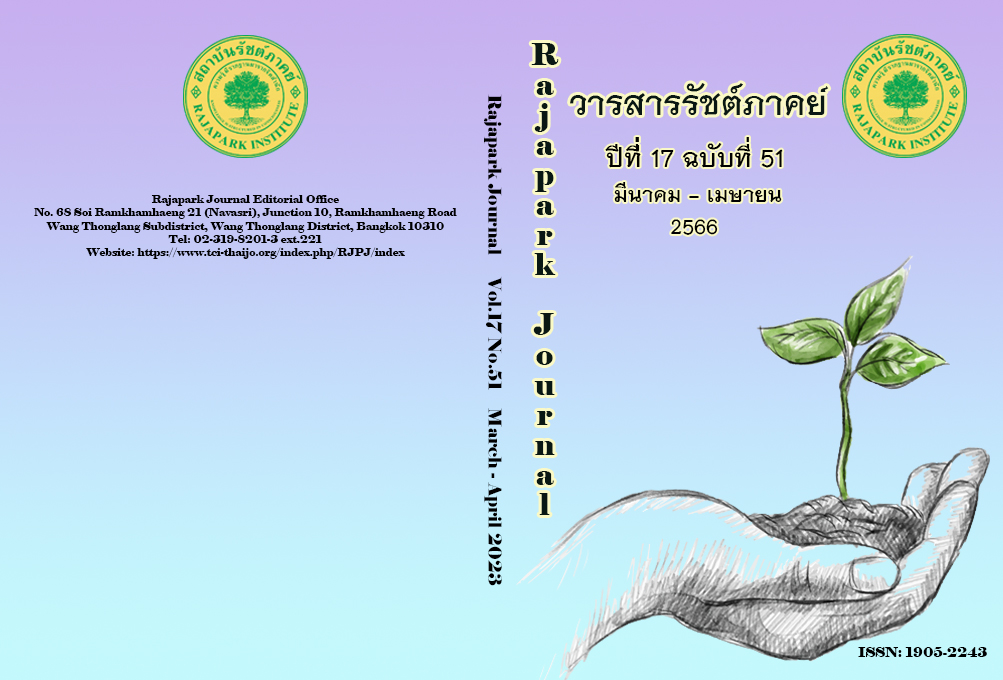Political Resistance Movement of Secondary School Students in 2020-2021
Main Article Content
Abstract
This qualitative research aimed to 1) study the structure; pattern; and strategies of political resistance movements; 2) study the conditions of social movement in political movements; and 3) study the ideas of political transmission by groups of secondary school students during 2563–2564 B.E. Data collection was an in-depth interview with 15 experts. Situational linkage and interpretation were data analysis. The results revealed that: 1. The political movement strategy that was communicated through social media included: i) structured political creative and non-violent activities; ii) uprisings across the country and political network collaboration; iii) individualistic-based movements of leaders; iv) resource-raising activity through social media; v) effective political activity by context; and vi) political activities by the student network. 2. The conditions and contexts regarded were: (i) politics during the military coup and post-military coup; (ii) economic factors during the military government and COVID-19); and (iii) educational problems and authoritarianism in schools. 3. Political ideology transmission among secondary school students i) utilized social media for political resistance movement; ii) denied knowledge from the government; iii) manifested an increase in interest in political history among the secondary school students; iv) had a request for students’ freedom protection; v) created a neo-political movement; and vi) was from authoritarianism and students’ rights violations in schools.
Article Details

This work is licensed under a Creative Commons Attribution-NonCommercial-NoDerivatives 4.0 International License.
Views and opinions appearing in the Journal it is the responsibility of the author of the article, and does not constitute the view and responsibility of the editorial team.
References
Charoensin-o-larn, C. (2001). New Social Movements. Wipasa.
Charoensin-o-larn, C. (2011). Introduction to the Concept of Post-popular Structures. Sommadhi.
Cheypratap, S. (2008). Communication, Politics and Democracy in a Developed Society. Chulalongkorn University Press.
Constitution of The Kingdom of Thailand. (2017). The Government Gazette, 134(40a), pp. 1-90.
Dhiravegin, L. (1973). Political Attitudes of the Bureaucratic Elite and Modernization in Thailand. Thai Wattana Panich.
Frank, A.G., & Fuentes, M. (1990). Social Movements. In New Directions in the Study of Justice, Law, and Social Control. Critical Issues in Social Justice. Springer.
iLaw. (2021). Open the Research on the Rally at Din Daeng Intersection Life has been Changed Because of the State's Failure. Confrontation is the Final Solution. https://ilaw.or.th/node/5997
Lertchoosakul, K. (2021). The Cold War (in) Between the White Bow. Matichonbook.
MGR Online. (2014). “Ying O" Don't Touch My Woman!!. https://mgronline.com/specialscoop/detail/9570000025164
Office of the National Economic and Social Development Board, National Strategy Secretariat Office. (2018). The National Strategy 2018-2037. http://nscr.nesdc.go.th/ns/
Pintobtang, P. (2009). Political Framework Analysis of the Theory of Social Movement. Heinrich Boll.
Pothitaen, W. (1991). Concepts and Ideal Democratic Models. Thammasat University.
Singkaneti, B. (2012). Fundamental Rights and Human Dignity under the Constitution. Winyuchon.
Stephen, P. (1998). Bridging the Gap between Class and New Social Movement Theory and Class. Rethinking Marxism, 10(4), 79–104.
Sukhothai Thammathirat Open University. (2014). Political Communication. Sukhothai Thammathirat Open University.
Wasinpiyamongkhon, N. (2015). Book Review: Democracy in Retreat: The Revolt of the Middle Class and the Worldwide Decline of Representative Government by Joshua Kurlantzick. Local Administration Journal, 9(1), 144-148.


